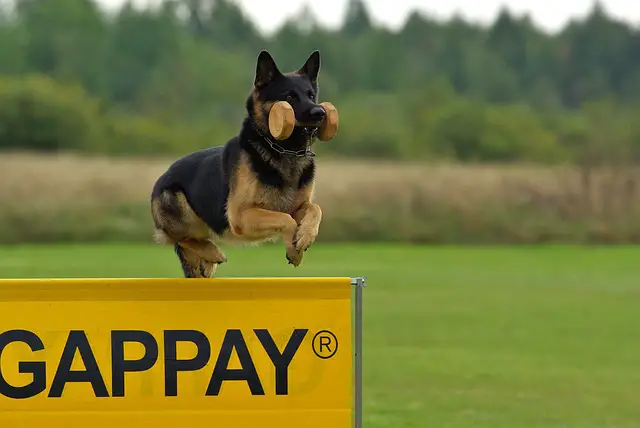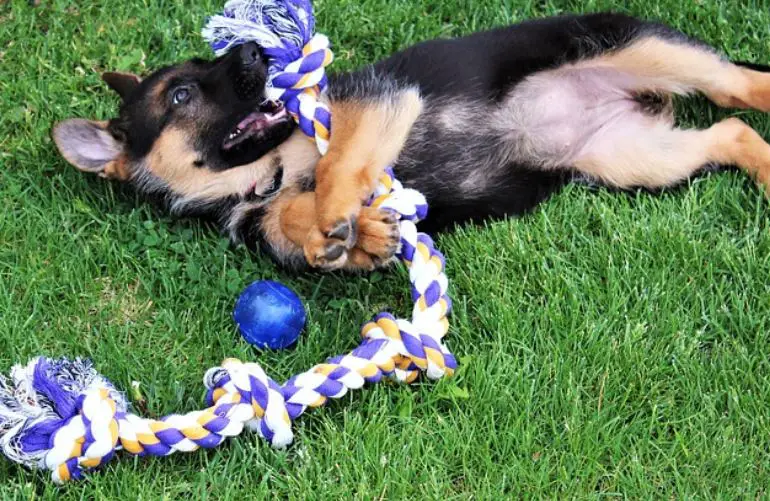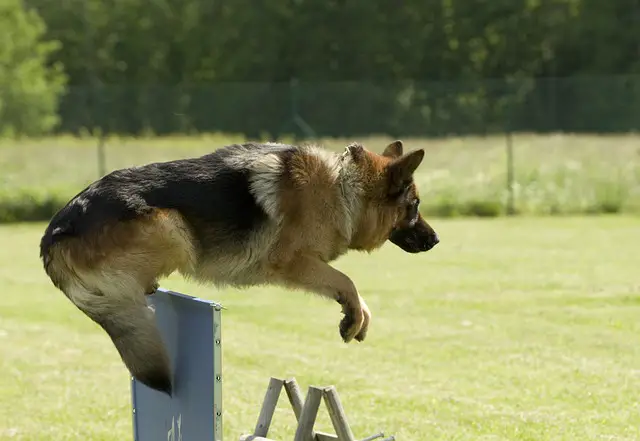German shepherd puppies are an adorable bunch of furballs who roll around making us hysterical with their side-splitting antics. They are just too cute and even bad behavior seems funny.
The big problem here is that you can’t let your German shepherd puppy behave any way they please just because they are too darn sweet to discipline!
If you let their behavior slide, you set yourself up for sometimes irreparable problems when they are fully grown.
An adult German shepherd can weigh upwards of eighty-eight pounds and no one wants a very large, strong, muscular dog to be out of control and rebellious.
This can be quite dangerous, as German shepherds are wonderfully intelligent and loyal but are also known for their sometimes no-nonsense attitude and for their instinctive guarding and protective nature.
This is why it’s very important that your German shepherd receives obedience training. Every breed needs the training to be a polite, well-mannered dog and it’s also for their safety and well-being as well as you, and your family’s.
Training your German shepherd is a serious business but there’s no reason to feel overwhelmed.
Below are some steps for German shepherd puppy training and also tips on how to discipline a German shepherd puppy

For your dog’s vitamin supplement, food, toys, or other dogs product please visit the Sundays for dogs website.
German Shepherd Training
When beginning the training of your German shepherd, there is one very important device you can use.
It is the strongest tool and it doesn’t cost a dime. The answer is; your voice! With your voice, you can soothe, calm, give direction, discipline, and praise all by the tone and the way in which you present it.
Dogs are very in tune with the tone of our voices. A few things to keep in mind when using your tone of voice:
- Keep all commands short and sweet
- Use a firm and confident tone
- Never yell or scream
- Only use a loud voice in dangerous situations
- Use a happy excited tone for praise
Listed below are different areas of training.
Housebreaking
Housebreaking needs to begin as soon as you bring your German shepherd puppy home. This does not have to be stressful for you or your puppy. Puppies are smart, especially German shepherds, and catch on pretty quickly.
Begin by taking the pup out every 20 to 30 minutes and especially after eating. Set aside a designated area in your yard and take them to that same spot every time.
When they are successful, use your “tone” of voice to give them plenty of excited praise. If you see them inside circling and sniffing, quickly whisk them outside. Accidents will happen because they are only puppies and need to get the hang of things.
Be consistent and give plenty of praise. Pretty soon they will be letting you know when they need to go out by standing by the door or giving a sharp bark.
Training on Leash
To begin training your German Shepherd on a leash they must first be acclimated to wearing a collar. Put your puppy’s collar on several times a day to get them accustomed to wearing it.
They will probably not like it at first and try to get it off but just have patience. Collars and tags should be worn for safety. If a puppy should become lost, his/her tags will help someone locate you.
To allow your puppy to become comfortable on the leash, clip it on and just let it drop so they can drag it around and get the feel for it. Then start holding the leash.
Don’t let your pup bite or chew on the leash or get into a tug of war. Simply drop the leash and wait until your shepherd is calm again.
Your pup will soon become ecstatic when you pull out its leash because this means fun times and adventure.
To check your shepherds’ health status or their DNA checks, please visit the Embark vet website for all the help you may need.

Basic Commands for German Shepherd
Begin training with basic commands at 8 weeks, which probably will be the age you bring your German shepherd puppy home. Keep sessions short and no longer than four or five minutes, teaching three sessions a day, morning, afternoon, and evening.
When your pup is young they will have a short attention span, so be patient and cut the session short if they lose interest. Also, spend the time on one command to start.
Trying to teach too many in a session will just confuse them. When they have mastered one, move on to another, but you always need to go back and review and practice all. Training is an ongoing process. Listed below are some basic commands.
sit – To teach sit
sit – To teach sit, have a treat enclosed in your hand, which pup will smell. Put your hand in front of their nose and then raise your hand up so that pup looks up. When the pup looks up, its bottom will go down.
Say “sit,” in a firm tone, when you move your hand up and “good,” in an excited tone if they sit. Your pup only gets the treat if they sit.
If you are having trouble getting them to sit you can gently press their bottom down when you say “sit.” Once they get the hang of it, have them sit longer each time until they are rewarded.
Stay
stay – Practice staying with your shepherd on the leash and have them sit beside you while holding the leash. Get up and step a short distance away.
At the same time hold your hand up like a traffic cop and say “stay” with a firm tone. If your pup comes over to you, repeat the command and action.
You may give a treat or just excited praise if they stay. Increase the time that they stay and also the space between you and the pup until you are able to leave the room and they continue to stay without following.
This will be cause for great excitement! You just need to have patience and be consistent.
Down
Down – To teach your shepherd the down position they should begin in a sitting position. You can try with a treat in your hand and move it to their nose.
Then move it to the floor while saying “down.” If they follow through they get a “good” and the treat.
You can also use the leash by gently pulling it downward while using the command “down.” Remember, that rewards and praise are for following through.
Come
Come – It is essential that your shepherd learn the command “come. This is a command that could possibly save your pup’s life and ensure that if they should become loose and head for the street, they will stop and come back to you if called.
Begin when your pup is away from you or enlist a friend to hold them. Say their name and “come.”
Getting them to come will probably be easy, but getting them to stay may be the hard part. Practice this farther away as they progress.
These commands and training on a leash are basic training skills your German shepherd needs to learn.
Again, keep training sessions short at first and as they get older and have a longer attention span you can gradually lengthen sessions.
When beginning with your eight-week-old pup, keep distractions to a minimum and as they get older, add some distractions.
In real life, when you want them to come, sit or stay, there will, most assuredly, be background noises and activities around them.

How To Discipline a German Shepherd
Just as children need to learn what is right and wrong, good and bad, puppies need to learn also. Children are disciplined for bad behavior and puppies need the same.
Discipline does not have to be yelling or screaming. It should be presented with firm words, but the best way is with positive reinforcement, which is plenty of praise for good behavior.
No one likes to be corrected all the time, not meaning that you should ignore bad behavior, but people and dogs perform much better when they are praised for their efforts, a job well done, and good behavior.
Many may think that punishment will work better, by isolating their pup when bad or rubbing their nose in an accident they’ve had.
These actions are not positive and may even worsen behavior and lead to aggression. Below are ways to discipline your German shepherd puppy.
Positivity
When your pup is lying quietly or playing with a toy busily, tell them what a “good pup” they are. You need to reward and encourage good behavior.
If your puppy is jumping all the time or gets out of control, nipping and biting when playing, tell them firmly, “no jumping,” or no biting,’ and walk away, ignoring them even if they make a fuss.
They were disciplined by their mother if a play was too rough with their littermates and led to nipping. Their mother would give a sharp warning bark which had the meaning of, “knock it off!”
When your shepherd is calm again, resume play and if they repeat their bad behavior, correct and ignore them once again. if they play nice, give them happy praise. It is the tone of your voice that makes the difference, not how loud you are.
Redirecting
Dogs often don’t understand when you tell them “no’ or “stop.” Sometimes you need to redirect them to something that is appropriate, If they are chewing on something that is off-limits, take them elsewhere and give them an acceptable chew toy to keep them busy.
Timing
If you don’t see your pup in the act of bad behavior, there is no sense in disciplining. They will not understand what you are scolding them for.
If you do witness it and correct them, they will associate the two actions. The main idea of positive reinforcement training is to concentrate more on your puppy’s positive actions.
If at first, those actions are hard to come by, pointing them in the right direction with plenty of encouragement will give more positive moments.
No no’s for you when disciplining your German shepherd.
- Be firm but remain calm and never yell or scream. If you become frustrated, step back and take a breather.
- Don’t correct when it’s “after the fact.” If you don’t see your puppy chewing on that table leg or have an accident on the rug, they won’t make the connection. This will also teach you not to leave a puppy unattended.
- Never hit your puppy, This will not solve behavior problems and may only cause fear or aggression.
- Don’t expect your puppy to immediately be the well-behaved puppy you just saw on the internet. “Rome wasn’t built in a day” and it will take time and work.
If training your German shepherd puppy seems a little too daunting, seek some help and enroll them in puppy classes where you will receive help yourself and your shepherd will get much-needed socialization as well as basic training.
Remember, begin training when the puppy is young, be diligent and consistent, have patience, give them plenty of exercise and praise and make your tone of voice work for you. Also, chill out! Your puppy is young but won’t be a puppy forever.
Cut them and yourself some slack. There will be good days and bad days. Play games, have fun, and keep in mind that they are learning and so are you. You are both “works in progress,” but sure to be a success.